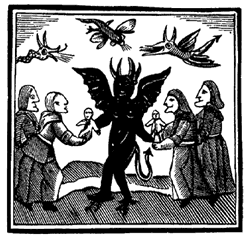Wincanton's focused community website, providing news and information including a full calendar
News » Community » Museum & History
Somerset Witches - Lecture by Andrew Pickering
Thursday 12 May 2011, 10:25
By John Baxter
 The fascinating story of one of England's darkest periods which includes the trials for witchcraft in this area. Our speaker is Andrew Pickering, Senior lecturer in History and Archaeology at Strode College and Programme Manager for local University of Plymouth students reading History and Archaeology. Together with David Pickering he has just completed a book, Witch-Hunting in England.
The fascinating story of one of England's darkest periods which includes the trials for witchcraft in this area. Our speaker is Andrew Pickering, Senior lecturer in History and Archaeology at Strode College and Programme Manager for local University of Plymouth students reading History and Archaeology. Together with David Pickering he has just completed a book, Witch-Hunting in England.
With its local focus and relevance to students likely to go on to Strode College this should be a lecture that will attract a lot of interest.
Friday 27th May in the Balsam Centre 7.30pm. £6 for adults - special rate to be decided for school students special rate of £1 for students, refreshments included.
Comments
Posts: 2
Reply #1 on : Thu May 12, 2011, 17:31:27
Posts: 1
Reply #2 on : Thu May 12, 2011, 20:54:38
Posts: 2
Reply #3 on : Tue May 31, 2011, 18:25:57
Posts: 1
Reply #4 on : Sun June 05, 2011, 12:19:08
Posts: 1
Reply #5 on : Fri December 07, 2018, 19:32:24
Login to comment!